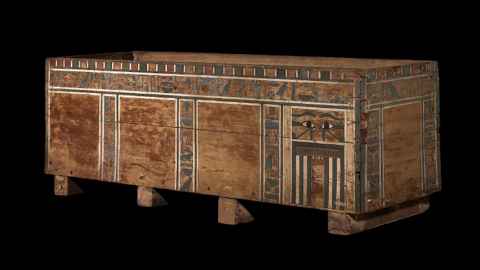Research on Egyptian coffins earns scholarship to Atlanta
11 July 2019
Arts graduate Emily Whitehead is heading off to Atlanta to do her PhD at Emory University on a full scholarship.

Emily completed her Master of Arts in Ancient History last year. Her thesis discussed the layout of the interior and exterior decoration of the coffins of two individuals from the Middle Kingdom of Egypt, and explored the connection between the inner and outer coffins.
The practice of having multiple coffins is known across ancient Egyptian history, but the meaning and function of this in the Middle Kingdom is not fully understood. Nobody could tell Emily why ancient Egyptians would have two coffins, so she decided to take this question on herself.
The coffins that she analysed are richly decorated. Emily explains that "while being practical funerary items, they are also a deeply personal reflection of life and death and they have multiple meanings on a social, economic, ideological and religious level".
There's something about reading dimensions and thinking 'that's a bit taller than me' but actually standing there with them made me realise just how physically big they actually are.
A highlight of her project was a trip to the British Museum to see the coffins in person. She was initially shocked at just how big they were, after having only read about them and seen them in photographs.
"There's something about reading dimensions and thinking 'that's a bit taller than me' but actually standing there with them made me realise just how physically big they actually are. It changed my perception of them as objects."
Emily was able to spend time in the organic storage area of the Museum taking photographs of the coffins, and being physically close to them. She enjoyed talking with the access and care team, who moved items for her that hadn't been off shelves for many years. Watching them lift the coffin lids gave her an appreciation of their weight, adding to her holistic understanding of the material.
I always comment on how Ancient History is particularly good for that sort of community building.
Emily says that she never considered anywhere other than the University of Auckland for her undergraduate study. She has been fascinated by museums since she was a child, and was always most interested in stories about people. She was captivated by Egypt and Greece in the first year of her Bachelor of Arts, and decided on Ancient History as her major.
She began working on coffins during her honours year after "going off on a tangent because I couldn't find anyone that was telling me why they would have two coffins, which felt so unusual for Egyptology".
Professor Anthony Spalinger supervised Emily's honours dissertation, and was willing to continue working with her when she approached him about looking at these coffins for her masters thesis.
"Tony's got such a wealth of knowledge," says Emily. "If I was having any difficulties he would just go 'there's this piece of work or that piece of work'. It was a really enjoyable project to work on with him."
She speaks highly of the welcoming and supportive environment for postgraduate students in Ancient History. "Professor Matthew Trundle always tells new honours students 'you're like a member of the discipline, and we expect to see you at things'."
"I used to try and attend as many seminars as possible. It's such an inviting discipline in that way. I would turn up to Greek and Roman seminars — as well as Egyptian ones — and it would spark ideas, and I would bump into other students and see how they were doing. Often there were drinks and nibbles afterwards and you got to chat not only with your lecturers but also with everyone else on quite an even level and ask questions."
"I presented at the annual 'day of papers' before I handed in my thesis and it was fantastic to get feedback from everyone. I always comment on how Ancient History is particularly good for that sort of community building."
One thing that’s always fascinated me about coffins is that they're so unbelievably personal, but because they’ve got so much art and literature and everything on them, we rarely get to the point of discussing that side.
Emily will continue her research at Emory with Dr Rune Nyord, a leading specialist in Middle Kingdom coffins. She is especially interested in exploring individual agency in the presentation of self through coffin decoration.
"One thing that's always fascinated me about coffins is that they're so unbelievably personal, but because they've got so much art and literature and everything on them, we rarely get to the point of discussing that side."
"It's an area that I find particularly interesting, and since I came into Ancient History with that particular interest in the stories of people, I thought this was a really good way to bring that all together. It also allows me to do the language, the art and the archaeology and not give up any of them, which is nice."
Emily received a Faculty of Arts Masters Thesis Scholarship and travel support from the School of Humanities PBRF Research Fund.
Media queries
Julianne Evans | Media adviser
Mob: 027 562 5868
Email: julianne.evans@auckland.ac.nz